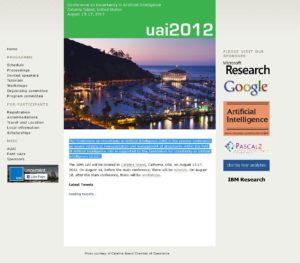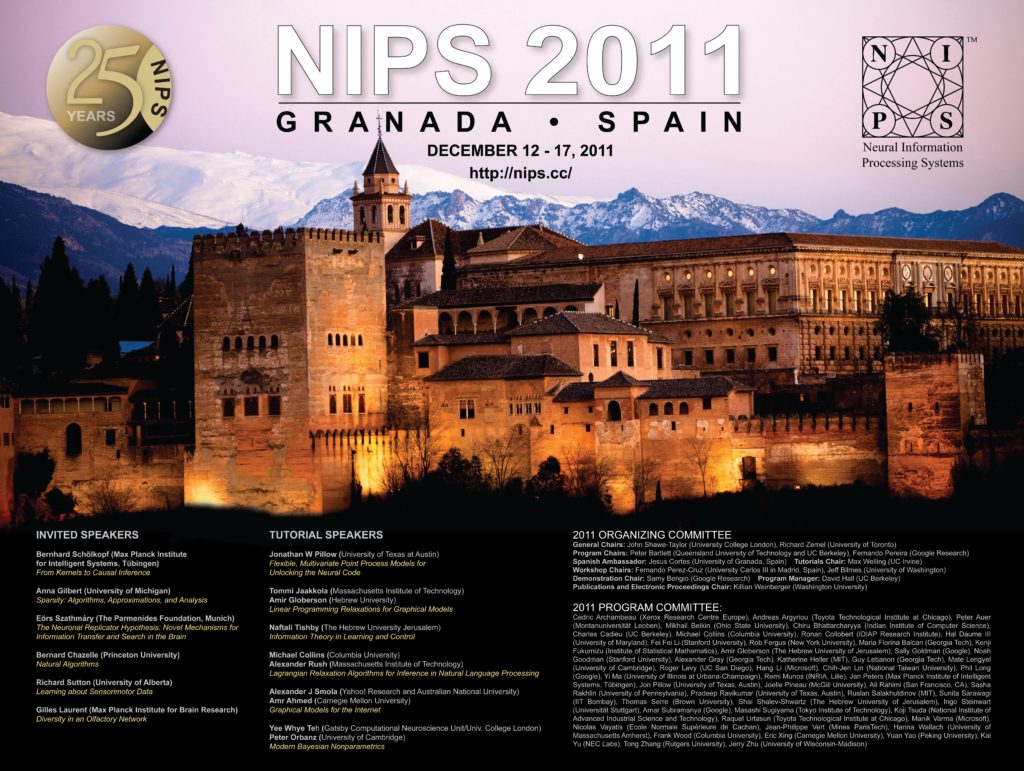The British Machine Vision Conference is one of the major international conferences on computer vision and related areas. Organized by the British Machine Vision Association, the 23rd BMVC was held at the University of Surrey, in the city of Guildford.
Welcome to BMVC 2012, it is our pleasure to host the conference at the University of Surrey in Guildford. This is the 23rd BMVC since its inception in 1990 and the second time Surrey has organised the conference. Almost 20 years have passed since BMVC in 1993 when it was chaired by John Illingworth with the support of the Centre for Vision Speech and Signal Processing (CVSSP) at the University of Surrey. We decided it was time for BMVC to return and our thanks go to our colleagues within CVSSP and to John for his contributions to the organisation. In fact BMVC goes back even further in the form of the Alvey Vision Club and our conference T-shirt gives a list of dates and venues for BMVC going back to the early Alvey days of the 80's.
BMVC has always maintained a single track and the format has changed little over the years. As the conference has grown in popularity its quality has increased, making it a prestigious event on the vision calendar. This year we received well over 400 submissions and accepted 8% of these for oral presentation and a further 24% for posters.
For 2012, we introduced changes to the reviewing process. We increased the reviewer pool to keep the loading low, despite increased submissions, and to ensure that reviewers could invest more time in their task. At least one reviewer per paper was nominated by an area chair. We also doubled the number of area chairs so that two area chairs were allocated to each paper. Unlike other conferences which operate a buddy system, our area chairs worked anonymously and independently and every paper had 2 recommendations justified in 2 consolidation reports. ACs who gave conflicting acceptance recommendations were invited into discussion to reach a consensus. As each AC had a different batch of papers, we were looking for consistency across both reviewers and area chairs to provide a robust decision making process. Oral papers were selected based on the reviews, AC consolidation reports, ranking in ACs. batches and suitability of the content for the general audience. Feedback indicates that this process has worked well and reviewers and area chairs from all over the world have worked hard to put together the highest quality program possible.
BMVC 2012 is a truly international conference. 67.5% of accepted papers are from Europe including 29% from the UK. There is also a significant 19.5% from North as well as from South America and 13% from Asia and Australia. The quality of research in these diverse locations is exceptionally high and it is also reflected in the selection of papers for oral presentations.
Sticking with the traditional single track format, BMVC starts on Monday afternoon with two tutorials; "Large-scale and larger-scale image search" by Dr Herve Jegou, INRIA and "MAP inference in Discrete Models" by Dr Pushmeet Kohli from Microsoft Research. We are also pleased to be able to welcome two invited speakers for the main conference; Prof Stan Sclaroff, Boston University (People in Motion: Pose, Action and Communication) and Prof. Jiri Matas, Czech Technical University (Visual Tracking in the 21st Century). On Tuesday evening there is a welcome reception hosted at Guildford Cathedral. While on Wednesday the conference banquet will be held at Brooklands Museum, the home of British Motorsport, and delegates will have exclusive access to the museum over drinks before dinner and awards in the clubhouse. On Friday, the BMVC Student Workshop will take place. This workshop has become a regular feature of BMVC and gives students in computer vision an opportunity to network and start collaborations at an early stage in their research career. The workshop will be single track containing both oral and poster presentations with keynote talks from Ariadna Quattoni UPC, Barcelona on .Latent Variable Models for Content-Based Image Retrieval and Structure Prediction. and Andrew Davison, Imperial College London on "Monocular SLAM and Real-Time Scene Perception".
As ever, BMVC proceedings are published by the BMVA as open access with the copyright retained by the authors. Extended abstracts of all the accepted contributions appear in this book. The full papers are published electronically on a USB key provided to delegates, and on the web with associated DOIs. Furthermore, the whole proceedings will be recorded and hosted online by videolectures.net and we are extremely grateful to the EU PASCAL2 network and video lectures for providing this service along with sponsorship of both the main conference and student workshop. We would also like to acknowledge the financial assistance of Microsoft Research, Stemmer Imaging and Toshiba all of which generously contributed to the conference as Gold sponsors. To 3DMD and Scorpion Vision as Silver sponsors and to Springer UK. We would like to thank the local organisation committee: Teofilo de Campos, John Illingworth and Fei Yan and especially Helen Cooper for taking great pleasure in doing all the organising we didn't want to do. We would also like to thank the student helpers and members of CVSSP who contributed, invited speakers and tutorial speakers and of course a huge debt to all the reviewers and area chairs for all the work they put in. Lastly many thanks to the authors for submitting the material to make this the best BMVC yet. We sincerely hope that you all have both a rewarding and enjoyable conference.
Richard Bowden, John Collomosse, Krystian Mikolajczyk
BMVC2012 General chairs
| Lourdes Agapito | Queen Mary, University of London |
| Abhir Bhalerao | University of Warwick |
| Mathew Blaschko | University of Oxford |
| Edmond Boyer | INRIA Grenoble |
| Toby Breckon | Cranfield University |
| Gabriel Brostow | University College London |
| Gavin Brown | University of Manchester |
| Matthew Brown | University of Bath |
| Tilo Burghart | University of Bristol |
| Andrea Cavallaro | Queen Mary, University of London |
| Mike Chantler | Heriot-Watt University |
| Ondrej Chum | Czech Technical University Prague |
| Adrian Clark | University of Essex |
| Tim Cootes | University of Manchester |
| Tim Ellis | Kingston University |
| Mark Everingham | University of Leeds |
| Vittorio Ferrari | University of Edinburgh |
| Andrew Fitzgibbon | Microsoft Research Cambridge |
| Aphrodite Galata | University of Manchester |
| Shaogang Gong | Queen Mary, University of London |
| Lewis Griffin | University College London (UCL) |
| Peter Hall | University of Bath |
| Edwin Hancock | University of York |
| Richard Harvey | University of East Anglia |
| Adrian Hilton | University of Surrey |
| Jesse Hoey | University of Waterloo |
| David Hogg | University of Leeds |
| Herve Jegou | INRIA Rennes |
| Frederic Jurie | University of Caen |
| Timor Kadir | University of Oxford |
| Pushmeet Kohli | Microsoft Research Cambridge |
| Xuelong Li | Birkbeck, University of London |
| Derek Magee | University of Leeds |
| Dave Marshall | Cardiff University |
| Stephen Maybank | Birkbeck, University of London |
| Walterio Mayol-Cuevas | University of Bristol |
| Steve McKenna | University of Dundee |
| Majid Mirmehdi | University of Bristol |
| Florent Perronnin | Xerox (XRCE) Grenoble |
| Stephen Pollard | Hewlett Packard Labs UK |
| Tony Pridmore | University of Nottingham |
| Ian Reid | University of Oxford |
| Paul Rosin | Cardiff University |
| Carsten Rother | Microsoft Research Cambridge |
| Jon Starck | The Foundry |
| Bjorn Stenger | Toshiba Research Europe |
| Chris Taylor | University of Manchester |
| Neil Thacker | University of Manchester |
| Bill Triggs | Laboratoire Jean Kuntzmann (LJK), Grenoble |
| Manuel Trucco | University of Dundee |
| Andrea Vedaldi | University of Oxford |
| Jakob Verbeek | INRIA Grenoble |
| Kevin Wells | University of Surrey |
| Tony Xiang | Queen Mary, University of London, |
| Jianguo Zhang | University of Dundee |
| Reyer Zwiggelaar | Aberystwyth University |
























